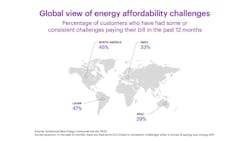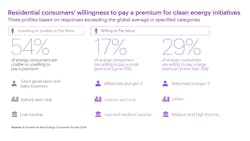Research Reveals Almost 40% of Households Struggle to Pay Electricity Bills and Most Cannot Pay a Clean-Energy Premium
The research includes insights from the 2024 New Energy Consumer survey of 16,800 residential energy consumers across 18 countries. It revealed 37% of households globally are experiencing challenges paying energy bills but only 36% reported being satisfied with their energy provider’s help saving on their energy bill.
Considering the energy crisis, the research report, “The energy provider’s guide to net zero: Managing consumer affordability and an affordable energy system,” aims to better understand current consumer sentiment on energy affordability. It includes economic modelling to evaluate the impacts on the household electricity burden from global power-sector investments required to achieve net-zero goals. The report highlights five strategies energy providers can take to resolve the dilemma of either increasing prices or slowing down investments and delaying net-zero goals by approximately 35 years.
The affordability challenge is universal. Many customers across all regions significantly struggle to pay their energy bills. Some have been hit harder than others – more consumers in North America (45%) and Latin America (47%) cited recent problems paying their energy bill compared to those in EMEA (33%) and APAC (29%).
Fulfilling Net-Zero Ambitions by 2050 Could More than Double the Average Electricity Bill, Unless Action is Taken
The affordability challenge is compounded by the need for energy providers to invest in and enable global net-zero ambitions by 2050. Accenture’s economic modeling estimates that $115 trillion must be spent by the global power sector alone. However, passing on these costs to consumers could more than double the average amount of household income spent on electricity bills from 6% to 14% by 2050, laying bare the case for rapid and radical action, including implementation of new customer-centered business models, innovative cost and productivity approaches and connected services to grow the business.
Given current economic conditions, most survey respondents are reticent to pay for the transition to net zero. More than half (54%) of those surveyed reported being unwilling or unable to support paying a premium for clean energy investments, with 48% of that group citing energy affordability as the cause. The exception was 29%, disproportionately young, urban consumers, who were willing to pay a premium of more than 15%.
That’s not to say residential consumers aren’t interested in the transition to cleaner energy – 81% confirmed they are. They just don’t necessarily see it as their responsibility to fund these initiatives through their energy bill, though survey respondents on average said they would be willing to pay a 9% to 10% increase in their average monthly energy bill for the transition.
Energy providers must lead on breaking the stalemate and facilitate an equitable transition
There are positive indicators that consumers will embrace clean energy, buoyed by the opportunity to reduce their energy usage and bills. 87% of residential customers surveyed said they would be interested in becoming buyers of clean energy-related products and services, from electric vehicle charging and battery storage to solar panels. Yet their primary motivation for doing so is to save money by reducing energy usage in the long term.
“Energy providers are asking themselves how to break the impasse: untenable cost to the customer or untenable delays to net zero," said Scott Tinkler, senior managing director and global utilities lead at Accenture. "We have to go beyond business as usual. Building from a strong digital core and leveraging data, AI and Generative AI, energy providers can act on a deeper understanding of consumers' clean-energy expectations to improve energy affordability.”
Further details, including five strategies for energy providers to make net zero affordable, can be found in the report, here.

